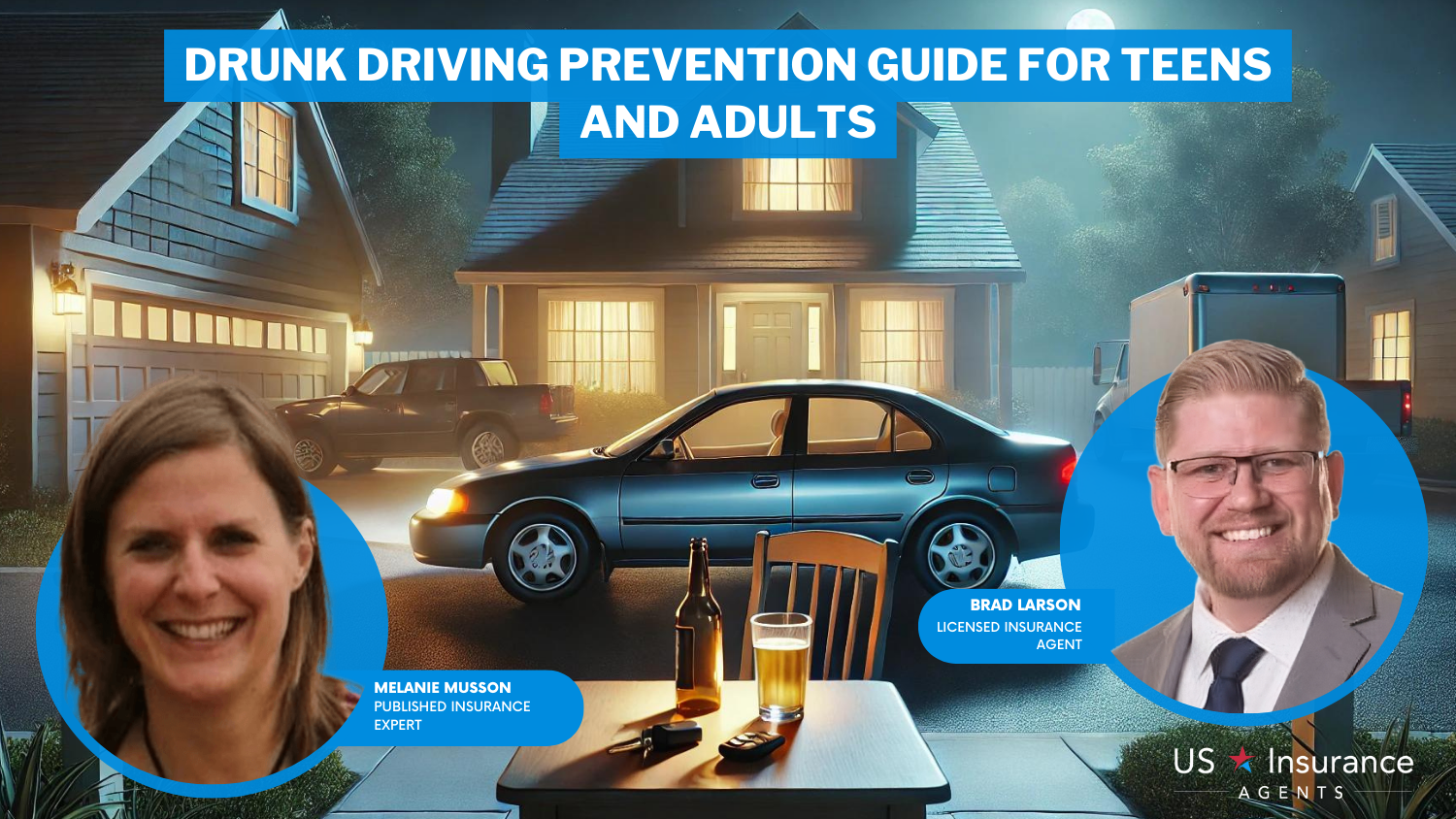What should I do if my car insurance claim is denied?
What to Do When Your Car Insurance Claim is Denied: Steps to Take and Options to Explore
Secured with SHA-256 Encryption





Table of Contents
Table of Contents


Published Insurance Expert
Melanie Musson is the fourth generation in her family to work in the insurance industry. She grew up with insurance talk as part of her everyday conversation and has studied to gain an in-depth knowledge of state-specific insurance laws and dynamics as well as a broad understanding of how insurance fits into every person’s life, from budgets to coverage levels. Through her years working in th...
Melanie Musson


Sr. Director of Content
Sara Routhier, Senior Director of Content, has professional experience as an educator, SEO specialist, and content marketer. She has over 10 years of experience in the insurance industry. As a researcher, data nerd, writer, and editor, she strives to curate educational, enlightening articles that provide you with the must-know facts and best-kept secrets within the overwhelming world of insurance....
Sara Routhier


Licensed Insurance Agent
Scott W Johnson is an independent insurance agent in California. Principal Broker and founder of Marindependent Insurance Services, Scott brings over 25 years of experience to his clients. His Five President’s Council awards prove he uses all he learned at Avocet, Sprint Nextel, and Farmers Insurance to the benefit of his clients. Scott quickly grasped the unique insurance requirements of his...
Scott W. Johnson
Updated September 2024
Having your car insurance claim denied can be frustrating and overwhelming. However, it’s important to remember that you still have options. In this article, we will discuss why car insurance claims are denied, what steps you can take immediately after a denial, how to appeal a denied claim, and how to prevent future claim denials. We’ll also explore the impact of a denied claim on your insurance rates and provide tips for protecting yourself.
Understanding Why Your Car Insurance Claim Was Denied
When your car insurance claim is denied, it’s natural to wonder why. Understanding the reasons behind claim denials can help you determine your next steps. Here are some common reasons for claim denial:
Common Reasons for Claim Denial
1. Excluded coverage: Your policy may not cover certain types of damage or incidents, such as damage caused by an uninsured driver or intentional acts.
It is important to carefully review your insurance policy to understand the specific coverage exclusions. These exclusions are typically outlined in the policy documents, and it is crucial to be aware of them to avoid any surprises when filing a claim. Knowing what is not covered can help you make informed decisions about your insurance needs.
2. Lack of evidence: If you fail to provide sufficient evidence to support your claim, such as photos, police reports, or witness statements, your claim may be denied.
When filing a car insurance claim, it is essential to gather as much evidence as possible to support your case. This evidence can include photographs of the damage, a detailed police report, and statements from witnesses who may have seen the accident occur. Providing thorough documentation can greatly increase the chances of your claim being approved.
Interpreting Your Denial Letter
When your car insurance claim is denied, your insurance company will send you a denial letter. Take the time to carefully review this letter, as it will provide important information about why your claim was denied. It may also outline the steps you can take to appeal the denial.
Denial letters often contain specific explanations for the denial, including references to the policy terms and conditions that led to the decision. It is crucial to read the letter thoroughly and understand the reasoning behind the denial. If you believe there has been a mistake or you have new evidence to support your claim, you may have the option to appeal the denial. Contact your insurance company for guidance on the appeals process.
Remember, understanding the reasons for claim denial can help you navigate the insurance claims process more effectively. By being aware of potential coverage exclusions and providing strong evidence to support your claim, you can increase your chances of a successful outcome.
Free Auto Insurance Comparison
Compare Quotes From Top Companies and Save
Secured with SHA-256 Encryption
Steps to Take Immediately After Claim Denial
Receiving a denial letter can be disheartening, but it’s important to remain proactive. Here are the steps you should take immediately after your claim is denied:
Contact Your Insurance Company
The first thing you should do is contact your insurance company to discuss the denial. Ask for a detailed explanation of why your claim was denied and what options you have moving forward.
When you contact your insurance company, it’s important to remain calm and professional. Explain your situation clearly and ask for any supporting documentation or evidence that led to the denial. By having a clear understanding of the reasons behind the denial, you can better assess the next steps to take.
During your conversation with the insurance company, take notes on the information provided. This will help you keep track of important details and ensure that you have a record of the conversation for future reference.
Review Your Insurance Policy
Take the time to carefully review your insurance policy. Pay close attention to the coverage limits, exclusions, and conditions. This will help you determine if the denial is justified or if there is a potential error or misunderstanding.
While reviewing your insurance policy, it can be helpful to highlight or make notes on any sections that are relevant to your denied claim. This will allow you to easily reference these sections during any future discussions with your insurance company or legal representation.
Additionally, it’s important to understand the terms and conditions of your policy to ensure that you are aware of any deadlines or specific requirements for filing an appeal. Knowing these details will help you navigate the process more effectively and increase your chances of a successful appeal.
Seek Legal Advice
If you believe that your claim was unjustly denied and you have exhausted all options with your insurance company, it may be time to seek legal advice. Consulting with an attorney who specializes in insurance claims can provide you with valuable insights and guidance.
An experienced attorney can review your case, assess the strength of your claim, and help you understand the legal options available to you. They can also guide you through the appeals process, negotiate with the insurance company on your behalf, or represent you in court if necessary.
When choosing an attorney, look for someone who has a proven track record of handling insurance claim denials. It’s important to find someone who is knowledgeable in insurance law and has experience advocating for policyholders.
Document Everything
Throughout the entire process, it’s essential to document everything related to your claim denial. Keep copies of all correspondence, including emails, letters, and notes from phone conversations. This documentation will serve as evidence and support your case should you need to escalate your claim.
Additionally, if you need to submit an appeal, make sure to keep a record of all the documents you send and receive. This will help you keep track of the progress of your appeal and ensure that you have all the necessary information readily available.
By documenting everything, you can provide a clear and comprehensive record of your claim denial and subsequent actions. This will be invaluable if you need to involve legal representation or regulatory authorities in the future.
How to Appeal a Car Insurance Claim Denial
If you believe your claim was unjustly denied, you have the right to appeal the decision. Follow these steps to increase your chances of a successful appeal:
Car insurance claims can be complex and frustrating, especially when your claim is denied. However, don’t lose hope just yet. There are several steps you can take to appeal the denial and potentially get the compensation you deserve.
Gathering Necessary Documentation
Before submitting your appeal, it is crucial to gather all the necessary documentation to support your case. This includes not only the basic information such as policy details and incident reports but also any additional evidence that directly relates to your claim. For example, if you were involved in a car accident, gather photos of the damage, repair estimates, and any medical records if applicable. These documents will strengthen your case and provide solid evidence to support your appeal.
Remember, the more comprehensive and organized your documentation is, the stronger your appeal will be. Make sure to keep copies of all the documents for your records and submit only the originals to the insurance company.
Writing an Appeal Letter
An appeal letter is a formal document addressed to your insurance company, explaining why you believe the denial of your claim is incorrect. When writing your appeal letter, it is important to be concise, clear, and professional in your communication. State the reasons why you believe the denial is unjust and provide supporting evidence for each point you make.
Start your appeal letter by clearly stating your name, policy number, and the date of the denial letter you received. Then, outline the specific reasons why you believe the denial is incorrect. Use factual information and refer to the supporting documentation you gathered earlier.
It is essential to remain calm and objective throughout your appeal letter. Avoid using emotional language or making accusations. Stick to the facts and present a strong argument to convince the insurance company to reconsider their decision.
Seeking Legal Advice
If your appeal is denied or you face significant challenges during the process, it may be beneficial to seek legal advice. An experienced attorney who specializes in insurance claims can guide you through the appeals process and help protect your rights.
A lawyer can review your case, assess the strength of your appeal, and provide you with expert advice on how to proceed. They can also negotiate with the insurance company on your behalf and represent you in court if necessary. Having legal representation can significantly increase your chances of a successful appeal and ensure that you receive the compensation you are entitled to.
Remember, appealing a car insurance claim denial can be a lengthy and complex process. It requires patience, perseverance, and a thorough understanding of your rights. By following the steps outlined above and seeking legal advice when needed, you can maximize your chances of overturning the denial and getting the coverage you deserve.
Preventing Future Car Insurance Claim Denials
Dealing with a denied car insurance claim can be frustrating and stressful. While you can’t control whether your claim will be denied, there are steps you can take to minimize the chances. Consider the following:
Ensuring Adequate Coverage
One of the most important steps in preventing future car insurance claim denials is to ensure that you have adequate coverage. Regularly reviewing your insurance policy is crucial to understanding the extent of your coverage. Make sure you understand the terms and conditions, as well as any exclusions or limitations that may apply to your policy.
It’s important to note that the minimum required coverage in your state may not be enough to fully protect you in the event of an accident. By increasing your coverage limits, you can provide yourself with added financial protection.
Another aspect to consider is the type of coverage you have. Liability insurance covers damages you may cause to others, but it does not cover damages to your own vehicle. Comprehensive and collision coverage can help protect your own vehicle in case of accidents, theft, or other incidents.
Regularly reassessing your coverage needs is essential, especially if your circumstances change. For example, if you have recently purchased a new car or made significant modifications to your vehicle, you may need to adjust your coverage accordingly.
Understanding Your Policy’s Terms and Conditions
Reading and understanding your car insurance policy’s terms and conditions is vital in preventing claim denials. Insurance policies can be complex documents filled with legal jargon, making it difficult for policyholders to fully comprehend their rights and responsibilities.
If there are any unclear provisions in your policy, don’t hesitate to reach out to your insurance company for clarification. They can provide you with the necessary information and explain any ambiguous terms or conditions. By gaining a clear understanding of your policy, you can navigate the claims process more effectively.
Knowing your rights as a policyholder is also crucial. Familiarize yourself with the laws and regulations in your state that govern insurance claims. This knowledge can help you identify any unfair practices or improper claim denials by your insurance company.
Additionally, it’s important to be aware of any deadlines or time limits for filing a claim. Missing these deadlines can result in a denial of your claim, regardless of its validity. Stay organized and keep track of all relevant dates to ensure you submit your claim on time.
Lastly, maintaining open and honest communication with your insurance company is key. If you have any questions or concerns about your policy or the claims process, don’t hesitate to reach out to them for assistance. Promptly reporting any accidents or incidents to your insurer is also crucial, as delays in reporting can lead to claim denials.
By taking these proactive measures, you can significantly reduce the chances of your car insurance claim being denied. Remember, prevention is always better than dealing with the aftermath of a denied claim.
Free Auto Insurance Comparison
Compare Quotes From Top Companies and Save
Secured with SHA-256 Encryption
The Impact of a Denied Claim on Your Insurance Rates
Having a car insurance claim denied can have long-term effects on your insurance rates. Here’s what you need to know:
How Denied Claims Affect Your Premiums
In some cases, having a claim denied can result in an increase in your insurance premiums. Insurance companies may view denied claims as a higher risk, which can lead to higher rates.
Protecting Yourself from Rate Increases
To protect yourself from rate increases, consider comparing insurance quotes with our free tool. By reviewing insurance rates from different companies online, you can save money and find the best rates for your coverage needs.
In conclusion, having your car insurance claim denied can be a frustrating experience, but it’s important to know that you still have options. By understanding why claims are denied, taking immediate action, appealing the denial when warranted, and taking steps to prevent future denials, you can navigate the claims process more effectively. Remember, protecting yourself by reviewing rates from different companies online can also help you find the best insurance coverage at affordable prices.
Frequently Asked Questions
What are some common reasons for car insurance claim denial?
Some common reasons for car insurance claim denial include policy exclusions, lack of coverage for the specific incident, failure to report the claim in a timely manner, and inaccurate or incomplete information provided.
What should I do if my car insurance claim is denied?
If your car insurance claim is denied, you should first review the denial letter or explanation provided by your insurance company. Understand the reason for denial and gather any additional information or documentation that may support your claim. You can then contact your insurance company to discuss the denial and provide any necessary evidence. If the issue remains unresolved, you may consider filing a complaint with your state’s insurance department or seeking legal advice.
Can I appeal a denied car insurance claim?
Yes, you can appeal a denied car insurance claim. Start by reviewing your insurance policy to understand the appeal process and deadline. Prepare a written appeal letter that includes the reasons why you believe the denial was incorrect, along with any supporting evidence. Submit your appeal to your insurance company and follow up to ensure it is received and processed.
How long does the car insurance claim appeal process take?
The car insurance claim appeal process duration can vary depending on the complexity of the case and the specific insurance company’s procedures. It may take several weeks to months for the appeal to be reviewed and a decision to be made. It is advisable to follow up with your insurance company regularly to check on the status of your appeal.
Are there any alternatives if my car insurance claim is still denied after the appeal?
If your car insurance claim is still denied after the appeal, you can explore alternative options. You may consider mediation or arbitration, which can help resolve disputes without going to court. Additionally, consulting with an attorney who specializes in insurance law can provide guidance on further legal actions you can take.
Is it possible to prevent car insurance claim denial?
While it is not possible to guarantee that your car insurance claim will never be denied, there are steps you can take to minimize the chances. Review your insurance policy carefully, understand the coverage and exclusions, and ensure you provide accurate and complete information when filing a claim. Promptly report any incidents to your insurance company and document all relevant details. Being proactive and maintaining good communication with your insurer can help reduce the risk of claim denial.
Get a FREE Quote in Minutes
Insurance rates change constantly — we help you stay ahead by making it easy to compare top options and save.




